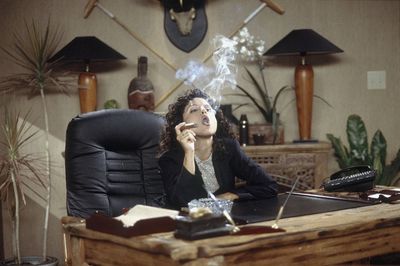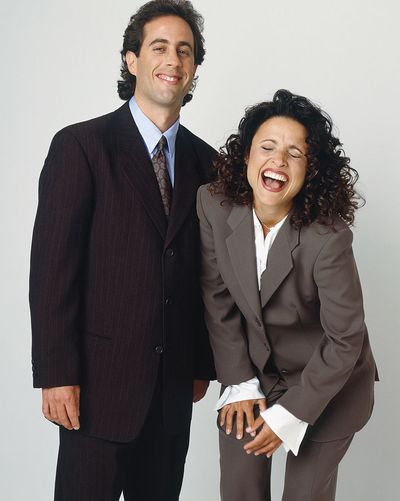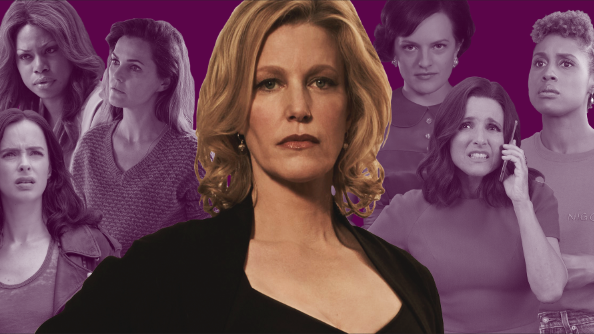After 30 Years, We Still Owe Elaine From 'Seinfeld' So Much
For better or worse, Julia Louis-Dreyfus's character was one of the first truly multifaceted TV heroines.

It was July 5, 1989—30 years ago this week—when a TV show about nothing introduced America to one of the greatest female characters in sitcom history. Initially written as The Seinfeld Chronicles with a group of all-male leads, the show was picked up for production with the caveat that its creators, Jerry Seinfeld and Larry David, include a woman among the main characters. And so Julia Louis-Dreyfus as Elaine Benes danced across our screen in the still-hilarious-after-all-these-years Seinfeld.
While shows like That Girl, Mary Tyler Moore, and Murphy Brown paved the way for independent women characters on television, Elaine moved the ball forward in a different sense. Sure, she was beautiful and smart. But she was also problematic, imperfect, and unshakably outspoken even when she wasn’t one hundred percent sure about something. She had a soft spot for highfalutin art-house films and Greenpeace, but was uncouth and indelicate in the way that women actually are. Stopping for candy rather than rushing to meet her boyfriend at the hospital? Mary Tyler Moore would never! In short, Elaine was compelling because of a character trait that we now take for granted: She was unapologetic about the kind of self-centered behavior usually reserved for TV’s male players.
Elaine Benes, TV’s ur-antiheroine and a questionable role model, laid down the foundation for characters like Liz Lemon of 30 Rock, Robin Sherbatsky of How I Met Your Mother, and Annie of Shrill—women who are occasionally unkempt or annoying, who refuse to fit into the societal norms represented elsewhere on TV, and who, as a result, are sometimes painfully relatable.
So, in celebration of 30 years of Get! Out!s and pleas for a spare square, we ID'd five ways in which Elaine Benes completely changed the landscape for women on television. We owe her much. Or, as she might put it, “Here's to those who wish us well, and those who don't can go to hell.”
She Proved Being Bossy Isn’t Bad
Elaine’s pushiness, both physically and socially, is rumored to have been based on a friend and ex-girlfriend of Seinfeld’s. Elaine yells, she shoves, she towers as much as a person of 5’3” stature can. Her boyfriend, Puddy, calls her bossy. At one point, Jason Alexander’s George confesses that he’s scared of her. At the end of the notorious episode “The Little Kicks,” George’s father challenges her with a, “You want a piece of me?” She replies, “I could drop you like a bag of dirt,” and the scene ends on a freeze-frame of her swinging a punch
That Elaine Benes was the biggest boss of the friend group, yet bossiness remained peripheral to her character, just shows how truly badass she was. She was multidimensional—and some of those dimensions were intimidating!

Now, of course, tons of female characters stand up for themselves without making it some sort of heroic character arc. Monica Geller (Courtney Cox) on Friends, which hit TV screens in 1994, was the most intimidating character in the main cast, and her noted physical strength notoriously surpassed her male counterparts. In multiple episodes, Monica wrestles her brother, Ross, and it’s implied she beats her friend-turned-paramour Chandler at arm wrestling at least once (“The One with the Halloween Party”). Monica is a powerhouse, but it adds to (rather than contradict) her femininity and she’s not on some crusade.
Get exclusive access to fashion and beauty trends, hot-off-the-press celebrity news, and more.
The fact that they could have some magnificent traits and some downright detestable ones is a testament to how well they were written.
Later, the introduction of Robin Scherbatsky (Cobie Smulders) on How I Met Your Mother could have filled the generic, pretty girlfriend role. Instead, Robin possesses far more traits formerly given to stereotypical male characters in group comedies (and she’s far more convincing at it than Neil Patrick Harris’s unnecessarily sexual conquest-obsessed Barney Stinson): She smokes cigars, she loves guns, she puts her career first, and she doesn’t shy away from a bar brawl.
When Elaine throws a punch or Robin throws a barstool, it's not set up as a uncharacteristically heroic gesture of a nice lady turned Wonder Woman—it tracks with their whole personality. Some of their qualities are even worth criticizing—Robin could be staunchly anti-other women, and who likes guns?! But the fact that these female characters could have some magnificent traits and some detestable ones simultaneously is a testament to how well they were written. They contradict themselves. They contain multitudes.
She Talked About Abortion on TV
In the 1994 Seinfeld episode “The Couch,” Elaine stands up and proudly states that the Supreme Court grants her the right to choose abortion. With her boycott of businesses that contribute money to “those fanatical anti-abortion groups,” as she puts them, this episode turns into an hilariously poignant debate about women’s bodily autonomy in a male-dominated show. That would be revolutionary now! In fact, it’s almost eerie considering the abortion-restricting bills rolling out lately to watch Elaine’s boyfriend du jour, played by David James Elliot, tell her, “Someday we’re going to get enough people on the Supreme Court to change that law.” Elaine sticks to her views and, despite their chemistry, she breaks up with her anti-choice boyfriend.
In 1972, a year before Roe passed, the sitcom Maude—a spinoff of All in the Family—introduced an abortion storyline to its progressive titular character in “Maude’s Dilemma.” The episode was nearly yanked off the air. And, almost 50 years later, the topic is still considered bold for television (though this is slowly changing). But Maude’s abortion arc was treated with intensity and seriousness. On the contrary, Elaine’s argument is, though staunchly pro-choice, still goofy and slightly absurdist. (Part of the difference may be that Maude’s was about a main character choosing whether to get an abortion, and Seinfeld’s handling of the issue keeps it in the realm of the hypothetical, which makes it easier to joke about.) As Kramer later ends up shouting, "It's not pizza until it comes out of the oven!"
In this year’s Shrill, the Aidy Bryant–led Hulu series based on Lindy West’s book of the same name, abortion is more of an inconvenience than a tragedy. It’s a key distinction that shows just how far we’ve come: In Seinfeld, abortion is brought up as nonchalantly as muffins or soup; Shrill kicks it up a notch, keeping our gaze with Bryant’s Annie as she undergoes the procedure. We hear the doctor narrating what’s going on so that Annie is aware of the process. She’s not distraught about or guilty for her decision. And yet, when her sometimes-boyfriend’s reaction to her choice is his own relief, Annie doesn’t let him off the hook—she points out that having a baby would have trapped him into “treating [her] like a human being.”
It’s a brilliant, nuanced take on abortion, and it’s possible that we would not be here, culturally, without characters like Elaine shouting her views from the rooftops.
She Was an Unapologetically Child-Free Woman
In a very ‘90s-TV-show turn of events, Elaine gets upset about her unmarried status when George gets engaged (“The Postponement”), but Seinfeld never focused Elaine’s story on trying to get a husband or have kids. In the episode “The Soul Mate,” Elaine sits among her female friends who pressure her to move to Long Island and “have a baby already,” as they’ve all done. Elaine’s defense: Why should she?

It was refreshing to have a female character proudly confirm that she doesn’t need to have kids to be a complete and happy woman, especially because so many shows before and since have struggled with the topic. But while many characters are as wedding-obsessed as Jennifer Aniston's Rachel Green on Friends (to whom we are literally introduced while wearing a wedding gown), there are occasionally those as proudly anti-kid as Samantha Jones, who even throws herself an I’m Not Having a Baby Shower.
She defied many of the labels so often lobbed at women who do what they want.
Our society still stigmatizes and continues to ignore women when they say they don’t want to be mothers, but Elaine was challenging these tropes three decades ago. That she was selfish in other areas had nothing to do with her wish to remain childfree, in the way that she defied so many of the labels so often lobbed at women who do what they want: She was successful but not career-obsessed, she liked kids even though she didn’t want them, and she dated and slept with whomever she liked. In the same episode, Elaine convinced a boyfriend (Tim DeKay) to commit to a vasectomy.
Women choosing to be childfree is one area in which pop culture still needs to catch up to the standard Elaine set.
She Was Fully in Charge of Her Sex Life—Including Her Contraception
Not only does the episode, “The Sponge,” put contraception front and center, it places it on such a pedestal that Elaine must deem her partners worthy of it. The episode aired in December of 1995 and spared no expense when it came to making a spectacle out of birth control sponges—though part of the joke is just how judgmental others were as Elaine stockpiled hers. Just eight years earlier, the LA Times wrote about how television was starting to openly discuss contraception—the word "condoms" was almost struck from a script. But then came Elaine, and she even coined a catchphrase: sponge-worthy.
Democratizing the topic of contraception for women on television, Elaine completely flipped the idea of sexual shame: Guys had to prove themselves in order to be blessed with everything sex entailed, including contraception. Are you worthy? Because she’s worth it.
She Had Style, She Had No Grace
The aforementioned episode “The Little Kicks” has, in the years since it first aired, become so iconic that the women of Broad City choreographed an entire tribute to it for Julia Louis-Dreyfus’s Mark Twain Award. Rumor has it that Larry David worried that the episode, in which we see Elaine dancing in what George refers to as “a full-body dry heave set to music,” would ruin Louis-Dreyfus’s career. It did the opposite, but it sure is memorable.
There were inelegant women earlier in TV history: That Girl’s Ann Marie was a klutz, but she was cute. Chrissy Snow of Three’s Company was the stereotypical dumb blonde, but since that was presented as her whole personality, so her ditziness could be read as charming. Elaine Benes, though, was sharp, attractive, successful...and sometimes an absolute dumpster fire of a person.
Before “The Little Kicks,” a klutzy female character was often sidelined into the role of airhead or considered childlike. One cringe-y example can be seen in the I Love Lucy episode “Equal Rights,” in which Lucy and Ethel aim to become champions for women’s equality, only to be outdone by their clumsiness and lack of money, turning the whole plot point into a joke.
But because we had Elaine, we could later have Liz Lemon (Tina Fey). Lemon often played the klutz, but she could also be the straight man to her co-worker Tracy Jordan (played by Tracy Morgan). And even when she was extraordinarily socially awkward—in “The Ones,” her boss (Alec Baldwin) walks in on her in a Slanket (that’s a blanket with sleeves) singing about “night cheese”—she was literally running the show. She still got the job done. Truly, a woman for all seasons.
In retrospect, Elaine Benes wasn’t meant to be a symbol of hope or an icon for women. She was just one of four stars—three of whom were male. It shouldn't have been revolutionary, but she avoided being the token gal pal. She applied the male gaze, flipped it, and reversed it. Today, we talk about so-called “bad feminists,” but Elaine nailed that thesis decades ago. She believed in the fundamental equality—for better or worse—of men and women. Without her, we might never have had 30 Rock, Fleabag, Shrill, or Parks and Recreation. And how boring would TV be then?
By not shackling Elaine to one stereotype, she could embody everything—even on a show about nothing.
For more stories like this, including celebrity news, beauty and fashion advice, savvy political commentary, and fascinating features, sign up for the Marie Claire newsletter.
RELATED STORY
